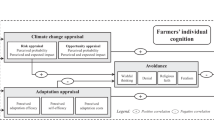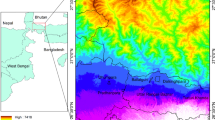Abstract
Pegged on Protection Motivation Theory, a modified socio-cognitive model of private adaptation to climate change and variability was deployed in order to provide a better understanding of the determinants of small-scale farmers’ adaptation intent and adoption of adaptation strategies in semi-arid lowlands of Mwanga District. In this regard, adaptation was conceptualized as a two-step process encompassing farmers’ perceptions that climate was changing and farmers’ response to changes. Basing on a pragmatic philosophy, a cross-sectional sequential explanatory mixed methods research design was deployed. During the first step-process, categorical data were collected through administration of a closed-ended survey questionnaire to 328 household heads. Binary and proportional odds logistic regressions were run through IBM SPSS (Version 20) in order to analyze categorical data for testing nine (9) null hypotheses. Statistically significant results were established when p values were < 0.05 at 95% confidence intervals. During the second step-process, qualitative data were generated through focus group discussions with 30 participants, in-depth interviews with 16 key informants, and participant observations and subjected to iterative thematic content analysis. The findings revealed that income, village’s geographical location, farming system, membership to farmer-based group, competitive price for produce, credit, age, education, and extension service positively influenced farmers’ adoption of adaptation strategies while workforce and perceived risk of rain on crop yields negatively influenced farmers’ adoption of adaptation strategies. Thus, it was concluded that farmers’ adaptation intent and adoption of adaptation strategies in the study area were largely explained by objective adaptive capacity rather than cognitive factors.





Similar content being viewed by others
References
Bagambilana FR (2019a) Assessment of farmers’ perceptions of climate change and attendant adaptation in semi-arid lowlands of Mwanga District, Tanzania. Dissertation, University of Dar es Salaam.
Bagambilana FR, Rugumamu WM (2019b) Understanding nexuses between precipitation changes and climate change and variability in semi-arid lowlands of Mwanga District, Tanzania. Afr J Environ Sci Technol 13(1):52–65
Banzi FM, Kips A, Kimaro DN, Mbogon JDJ (1992) Soil appraisals of four village irrigation schemes in Mwanga District, Kilimanjaro Region. Mimeo, NSS, Tanga, Tanzania.
Blennow K, Persson J (2009) Climate change: Motivation for taking measure to adapt. Glob Environ Change 19(1):100–104
Bryan E, Deressa TT, Gbetibouo GA, Ringle C (2009) Adaptation to climate change in Ethiopia and South Africa: Options and constraints. Environ Sci Policy 12:413–426
Burnham M, Ma Z (2016) Climate change adaptation: Factors influencing Chinese farmers’ perceived self-efficacy and adaptation intent. Regional Environ Change 17:171–186
Cismaru M, Cismaru R, Ono T, Nelson K (2011) Act on climate change: An application of protection motivation theory. Soc Mark Q 17:62–84
Clayton S, Devine-Wright P, Stern PC, Whitmarsh L, Steg L, Swim J, Bonnes M (2015) Psychological research and global climate change. Nat Clim Change 5(7):640–646
Cole M (2021) Climate change, the fourth industrial revolution and public pedagogies: the case for ecosocialism. Routledge, London.
Comoé H, Siegrist M (2015) Relevant drivers of farmers’ decision behaviour regarding their adaptation to climate change: A case study of two regions in Côte d’Ivoire. Mitig Adapt Strateg Glob Change 20:179–199
Creswell JW, Creswell JD (2018) Research design: Qualitative, and mixed methods approaches, 5th ed. SAGE Publications, Inc, Thousand Oaks, CA.
Dang HL (2014). Adaptation to climate change: the attitude and behaviour of rice farmers in the Mekong Delta, Vietnam. Thesis, University of Adelaide.
Debalke NM (2011). Determinants of farmers’ preference for adaptation strategies to climate change: evidence from north Shoa Zone of Amhara Region. MPRA Paper No. 48753. https://mpra.ub.uni-muenchen.de/48753/
Deressa TT, Hassan RM, Ringler C (2011) Perception of, and adaptation to, climate change by farmers in the Nile Basin of Ethiopia. J Agric Sci 149:23–31
Deressa TT, Hassan RM, Ringler C, Alemu T, Yesuf M (2009) Determinants of farmers’ choice of adaptation methods to climate change in the Nile Basin of Ethiopia. Glob Environ Change 19(2):248–255
Drew S, Guillemin M (2014) From photographs to findings: Visual meaning-making and interpretive engagement in the analysis of participant-generated images. Visual Studies 29(1):54–67
FAO (Food and Agricultural Organisation) (2015) Climate change and food systems: Global assessments and implications for food security and trade. FAO: Rome.
Felton AJ (2021). Response of terrestrial net primary productivity to precipitation extremes: Patterns, mechanisms, and uncertainties: Fares, A. Climate change and extreme events. Elsevier, Cambridge, MA, p 57–81.
Field A (2018). Discovering statistics using IBM SPSS statistics, 5th edn. SAGE Publications Ltd, Thousand Oaks, CA.
Frank E, Eakin H, López-Carr D (2011) Social identity, perception and motivation in adaptation to climate risk in the coffee sector of Chiapas, Mexico. Glob Environ Change 21(1):66–76
Galema A, Madundo G (1992) Participatory evaluation and planning in technology transfer: Experiences of MIFIPRO with animal traction. Paper prepared for COOPIBO seminar on participatory extension and sustainable agriculture held on 26 April - 9 May 1992, Butare, Rwanda.
Grothmann T, Patt A (2005) Adaptive capacity and human cognition: The process of individual adaptation to climate change. Glob Environ Change 15:199–213
Grothmann T, Grecksch K, Winges M, Siebenhüner B (2013) Assessing institutional capacities to adapt to climate change: Integrating psychological dimensions in the adaptive capacity wheel. Nat Hazards Earth Syst Sci Discuss 1:793–828
Ho R (2018). Understanding statistics for the social sciences with IBM SPSS. CRC Press, Boca Raton, FL.
IFRC and RCS (International Federation of Red Cross and Red Crescent Societies) (2013). Tanzania drought and food insecurity: Emergency appeal n° MDRTZ012 - final report. IFRC & RCS. https://www.google.com/url?sa=t&rct=j&q=&esrc=s&source=web&cd=&ved=2ahUKEwjN3u3a_s39AhXBTEEAHVrVCU4QFnoECAkQAQ&url=https%3A%2F%2Fwww.ifrc.org%2Fdocs%2Fappeals%2F11%2FMDRTZ012EA.pdf&usg=AOvVaw0CxqhV3NApeMqXpKBHFOCB
IPCC (Intergovernmental Panel on Climate Change) (2014) Climate change 2014: Effects, adaptation and vulnerability. Contribution of Working Group II to the Fifth Assessment Report of the IPCC. Cambridge University Press, Cambridge.
Jones L, Boyd E (2011) Exploring social barriers to adaptation: Insights from Western Nepal. Glob Environ Change 21(4):1262–1274
Kolade O, Harpham T (2014) Impact of cooperative membership on farmers’ uptake of technological innovations in southwest Nigeria. Dev Stud Res 1(1):340–353
Kuruppu N, Liverman D (2011) Mental preparation for climate adaptation: The role of cognition and culture in enhancing adaptive capacity of water management in Kiribati. Glob Environ Change 21(2):657–669
Liu X (2016) Fitting proportional odds models for complex sample survey data with SAS, IBM SPSS, Stata, and R’. Gen Linear Model J 42(2):30–39
Lo AY (2013) The role of social norms in climate adaptation: Mediating risk perception and flood insurance purchase. Glob Environ Change 23(5):1249–1257
Lorenzoni I, Whitmarsh L (2014) Climate change and perceptions, behaviors, and communication research after the IPCC 5th Assessment Report - a WIREs Editorial. Wiley Interdiscip Rev: Clim Change 5(6):703–708
Maddison D (2006) The perception of, and adaptation to, climate change in Africa. CEEPA. Discussion Paper No. 10. Centre for Environmental Economics and Policy in Africa. University of Pretoria, Pretoria.
Madundo G, Galema A (2000) Farmers’ experiences with weeding technology in Mwanga District, Kilimanjaro Region, Tanzania. In: Stanley P, Simalenga T (eds). Animal power for weed control. A resource book of the Animal Traction Network for Eastern and Southern Africa (ATNESA). ATNESA, Wageningen.
Matsa M (2021) Climate change and agriculture in Zimbabwe: sustainability in minority farming communities. Springer Nature, Cham.
MDC (Mwanga District Council) (2011) Mwanga district social-economic profile. Mwanga. MDC.
MDC (Mwanga District Council) (2016) Mwanga district socio-economic profile. Mwanga: MDC.
Panda A, Sharma U, Ninan KN, Patt A (2013) Adaptive capacity contributing to improved agricultural productivity at the household level: Empirical findings highlighting the importance of crop insurance. Glob Environ Change 23(4):782–790
Patt AG, Schröter D (2008) Perceptions of climate risk in Mozambique: Implications for the success of adaptation strategies. Glob Environ Change 18(3):458–467
Rogers RW (1975) A protection motivation theory of fear appeals and attitude change. J Psychol 91:93–114
Rugumamu WM (2015) Development process, planet earth resources and environmental change. J Geograp Assoc Tanzan 36(2):1–20
Smucker TA, Wangui EE (2016) Gendered knowledge and adaptive practices: Differentiation and change in Mwanga District, Tanzania. Ambio 45(3):276–286
Smucker TA, Wisner B, Mascarenhas A, Munishi P, Wangui EE, Sinha G, Weiner D, Bwenge C, Lovell E (2015) Differentiated livelihoods, local institutions, and the adaptation imperative: Assessing climate change adaptation policy in Tanzania. Geoforum 59:39–50
Stefanović J (2015) Smallholder farming systems in Kenya: Climate change perception, adaptation and determinants. Thesis, University of Basel.
Ung M, Luginaah I, Chuenpagdee R, Campbell G (2016) Perceived self-efficacy and adaptation to climate change in Coastal Cambodia. Climate 4(1):1–16
URT (United Republic of Tanzania) (2013) 2012 Population and housing census: Population distribution by administrative areas. National Bureau of Statistics, Dar es Salaam.
Yamane T (1967) Statistics: an introductory analysis, 2nd edn. Harper and Row, New York.
Author information
Authors and Affiliations
Corresponding author
Ethics declarations
Conflict of interest
The authors declare no competing interests.
Supplementary Information
Rights and permissions
Springer Nature or its licensor (e.g. a society or other partner) holds exclusive rights to this article under a publishing agreement with the author(s) or other rightsholder(s); author self-archiving of the accepted manuscript version of this article is solely governed by the terms of such publishing agreement and applicable law.
About this article
Cite this article
Bagambilana, F.R., Rugumamu, W.M. Determinants of Farmers’ Adaptation Intent And Adoption of Adaptation Strategies To Climate Change And Variability In Mwanga District, Tanzania. Environmental Management 72, 785–804 (2023). https://doi.org/10.1007/s00267-023-01792-2
Received:
Accepted:
Published:
Issue Date:
DOI: https://doi.org/10.1007/s00267-023-01792-2




